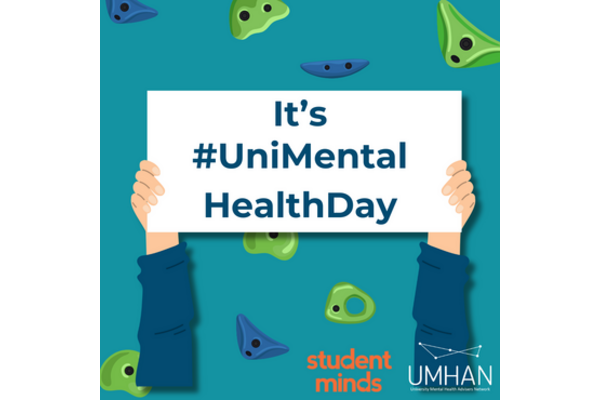UMHAN Trustee Phil Scarffe uses his extensive experience of working in student mental health, and background as a social worker, to comment on issues at the heart of student safety after recent discussions around statutory duty of care.
I’ve commented in a previous blog, on the concept that ‘different things work in different places’ and my suspicion that over the years, it has done a great deal of the ‘heavy lifting’ in explaining different practices across the sector. On the one hand it is a concept with almost infinite scope, and so very difficult to argue against, but on the other it could be seen as a way of sitting resolutely on the fence.
There has generally been a view that universities have a duty of care towards their students, but what that might entail and how, in the event of legal challenge people or institutions might be held to account has always been quite a vague concept. Certainly, it was about preventing foreseeable harm by acts of negligence, but beyond that there has never really been a great deal of unanimity.
Equality Act
Oddly the duties which a university has under the Equality Act, which are much more clearly defined have been much less of a source of discussion, but I would argue present a compelling case of a fairly comprehensive set of duties in relation to disabled students, and ought to be seen as of far more relevance to the issue of suicide prevention, than most of the sector narrative would suggest.
The Equality Act Technical Guidance has always made it clear that duties stem from students sharing information, which should reasonably be interpreted as constituting a disability, and not from the student themselves correctly interpreting the legislation and requesting adjustments, nor from them having navigated university systems in the way which is administratively most convenient. Building an understanding of that concept, and the necessary infrastructure across the sector, would in my view substantially contribute to a culture of early intervention.
The flaw being that it is profoundly difficult to assert your rights under the Equality Act, and detailed knowledge related to the requirements of the legislation, largely sits within specialist teams within universities, rather than residing in student unions, or other sources of student advocacy. As such the risks for the HE sector around non-compliance won’t tend to feature highly in the minds of senior leadership within universities, as the most pressing of the many risks which they need to manage.
To complicate the disability picture a bit further, generally students who are dissatisfied with their experiences at university are encouraged to seek informal resolution through university complaints procedures, which if they don’t achieve their intended outcome, can lead to their case being considered by the Office of the Independent Adjudicator (OIA). The OIA are clear that they don’t consider whether a university has complied with the Equality Act, but nevertheless consider whether a university has acted fairly, which does inevitably often include consideration of approaches taken to disability.
Perhaps reform of the Equality Act in a way which makes it easier for people to assert their rights, might act as a significant driver for improvement of both student safety, and the student experience more broadly.
Safeguarding
Coming from a different angle, there are also a growing set of expectations in relation to what I’m going to broadly term ‘Safeguarding duties’, which is a problematic term, as it can mean, depending who you are talking to, and the context, variously statutory Safeguarding duties, protecting individuals from harm, or a safeguarding culture incorporating all aspects of culture and support within a university.
On top of which the Office for Students (OfS), who oversee the vast majority of university courses, have vastly different expectations focussing on issues such as domestic violence, and harassment, than Ofsted who oversee Degree Apprenticeships, and will automatically fail a provider, if they are not happy with the approach adopted to child protection. Ofsted’s approach of course being very heavily influenced by largely ‘lifting and shifting’ expectations placed on schools where the duty of care is far clearer than it is in Higher Education.
Regulation
Both UUK, with their Step Change framework, and particularly Student Minds with their University Mental Health Charter have set out ambitious ideas about what universities might strive to look like in their approach to mental health. Neither of them, however, provide a description of what students could currently expect to find as common practice across the university sector, nor indeed provide any meaningful way for universities to be held to account in the event that practice is felt to be sub standard.
Neither was written with the intention of providing a regulatory framework, and presumably, would have been written somewhat differently, if that was the intention.
It is probably an understatement to suggest that the picture is a complicated one, and that’s without really touching on press and public expectations, which are often very much at odds with the way in which universities have traditionally seen themselves. Though, with universities increasingly selling themselves on the student experience, a very reasonable question to ask is whether what marketing departments tell students is always an accurate reflection of the way universities work.
The ‘Learn’ network which describes itself as ‘bereaved families connecting to prevent suicide’ have meanwhile lobbied for universities to have a ‘statutory duty of care to their students’. UUK are listed on their website as an alliance, and bereaved families were clearly very influential in the formation of the guidance which UUK issued on sharing information with families. This guidance certainly went a lot further than I know many UMHAN members thought was advisable, forming part of the UUK’s Suicide Safer Universities guidance.
Over the issue of a ‘statutory duty of care for students’ the Learn Network and UUK, however part company. UUK suggests that in fact there is an existing duty of care, and that additional legislation would be counter-productive, possibly leading institutions to adopt a risk averse approach to innovation. Instead, they point to the work which they have undertaken to try to nudge change forwards in the sector, as a better route forwards.
The relationship of a university with its students is not one in which they exercise substantial control, and despite the wider expectations of Ofsted, my experience of their inspections has been, that they accept that in an adult learning environment choice, autonomy and privacy are important considerations, and that it is neither desirable or practical for universities to be as interventionist as a school would be expected to be.
Would there be anything to be gained from further legislation? Frankly the devil is in the detail. An overly simplistic piece of legislation would probably just add unnecessary complexity, and speaking as a UMHAN trustee, I am not always convinced that the expert views of mental health professionals working in Higher Education feature as prominently as they might, in sector level policy development, and so I would fear such a culture might feed through to poorly constructed legislation, which could increase rather than decrease risk.
How given this complex picture of inspection, guidance, and political pressure, are mental health professionals to ground their practice and ensure they offer appropriately boundaried, and highly professional services to their students, and does UMHAN have a role to play in advancing the debate around approaches to these issues at a sector level?
Mental Health Services in HE
Neither the Learn Network on their website or UUK in their statement in relation to the issue of legislating on a duty of care comment very much on how mental health support services in Higher Education work. This is on one level incredibly surprising, given that in practice this is overwhelmingly where approaches to mental health are mediated within universities, even if some universities may claim to have achieved university wide approaches. On another level, whilst probably not by design, this is quite interesting since the vast majority of people who die by suicide are not in touch with mental health services.
It also feels to me that the debates which are raging around approaches to student mental health don’t really engage with the question of what sort of support service we want for our students. The services which are currently provided have generally been developed with an understanding of legislative requirements, or at least what is generally perceived as good practice, across mental health services provided by, or in association with the NHS, and in the third sector.
Principles such as the right to choose to engage in services, personal autonomy, privacy and confidentiality feature heavily within the minds of most mental health practitioners. Operating to these principles does mean accepting a limitation to the extent to which practitioners can either manage or influence risk, which has always been difficult for non-mental health professionals to understand. If the aim is to protect and prevent, the argument might be that far more interventionist approaches are needed.
Surprisingly absent from the debates seem to be those who are concerned with the rights of people with mental health conditions. We have, as a society, been down the road before of trying to move towards more coercive approaches of attempting to control the actions of people with mental health conditions, the narrative in the past often having centred around preventing harm to others. When those debates have been prominent in wider society, they have been massively influenced by those with lived experience, who have very successfully forestalled some of the more draconian ideas, because of the damaging impact on their rights. The fact that you erode someone’s rights, and erode their autonomy seems to me to be a predictor of an increased risk of people falling into levels of despair, which feel unbearable, rather than the opposite, and would make engagement with services something people did more reluctantly.
UMHAN’s Conduct & Capability Framework
What UMHAN can do, within this myriad of issues, is support colleagues to consider how mental health support in universities can be provided professionally and safely, and our membership framework is I believe a very useful tool to assist practitioners to ensure that they achieve precisely that. A lot of what is contained in the framework, would probably not be terribly surprising to non mental health practitioners, the need for CPD, appropriate supervision and oversight, practising ethically etc.
What might be more surprising to non mental health professionals is the section on ‘Promoting Health and Safety and Positive Risk Taking’. This section discusses working within the boundaries of the role, and the importance of boundaries to the role. In the context of there being significant debate about what the extent of university’s duties should reasonably be, there perhaps ought to be some consideration from delineating the responsibility of the whole organisation, from that of a particular service or team. Using the framework for discussion within the team, and to the wider university of what the service is ‘for’ and crucially what it is resourced to do, would I think be incredibly helpful.
This links to another point within the framework, which is being clear and transparent with students about what the service does. One of the most dangerous places we can find ourselves is over promising on what we can deliver, but given the heat of the debate around student wellbeing, there is every possibility that some senior members of staff, far removed from the reality, and extent of student wellbeing issues, may be tempted to do precisely that.
We’ll know we’re making progress on these issues, when awards and plaudits are given out, not on the basis of ‘going the extra mile’, but for maintaining safe and professional boundaries in challenging situations.
Perhaps more than any statement in the framework, the following captures for me, the essence of what good mental health practice should entail:
Empowering people to decide the level of risk they are prepared to take with their lifestyle, health and safety. This includes working with the tension between promoting healthy choices, safety and positive risk taking, ensuring that assessment of possible risks has been undertaken by appropriate services, taking into account the particular context-specific issues of Higher Education, and local action taken.
I imagine that this could be seen by some, as a vague philosophical statement, which is passed over in the race to define what the future of mental health in Higher Education looks like. Mental Health professionals however know that facing risk is fundamental to how people develop the skills to be able to live full and productive lives. Paradoxically then the approach to keeping people safe, can never sensibly be focussed on eliminating risk, and I think we need to be honest as a society in saying that our collective understanding of how to manage risk in relation to mental health, is still very much developing, and that ultimately the answers will rest with what society as whole chooses to do.
I thoroughly recommend that people spend the time to read our Membership Framework – I suspect for many it will help confirm they are doing an excellent job, but may also help with thinking through some thorny issues. I hope that as the debate on mental health in Higher Education progresses, that the collective wisdom of UMHAN members, as so articulately expressed in these documents, becomes more influential on the direction of travel.









